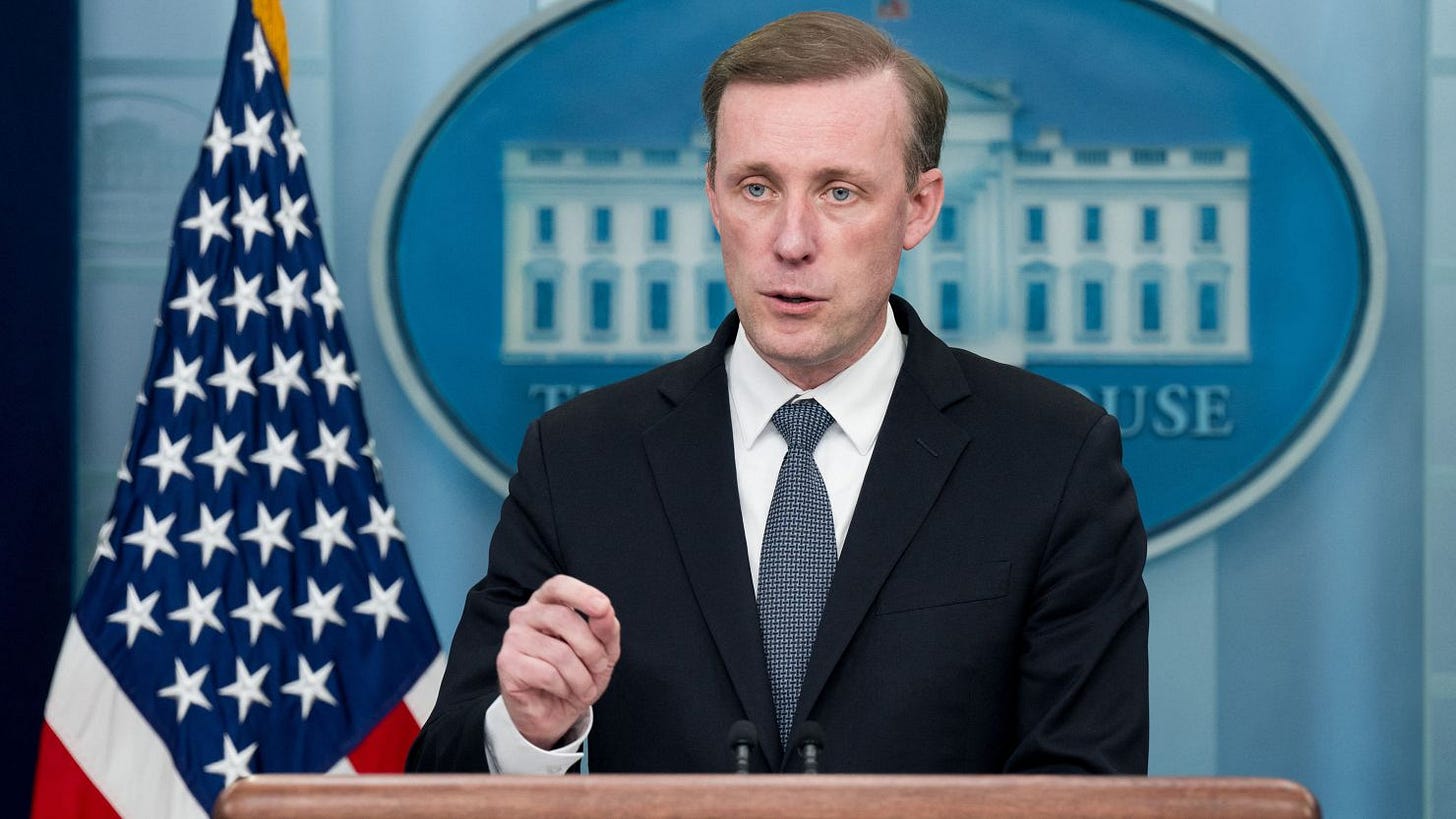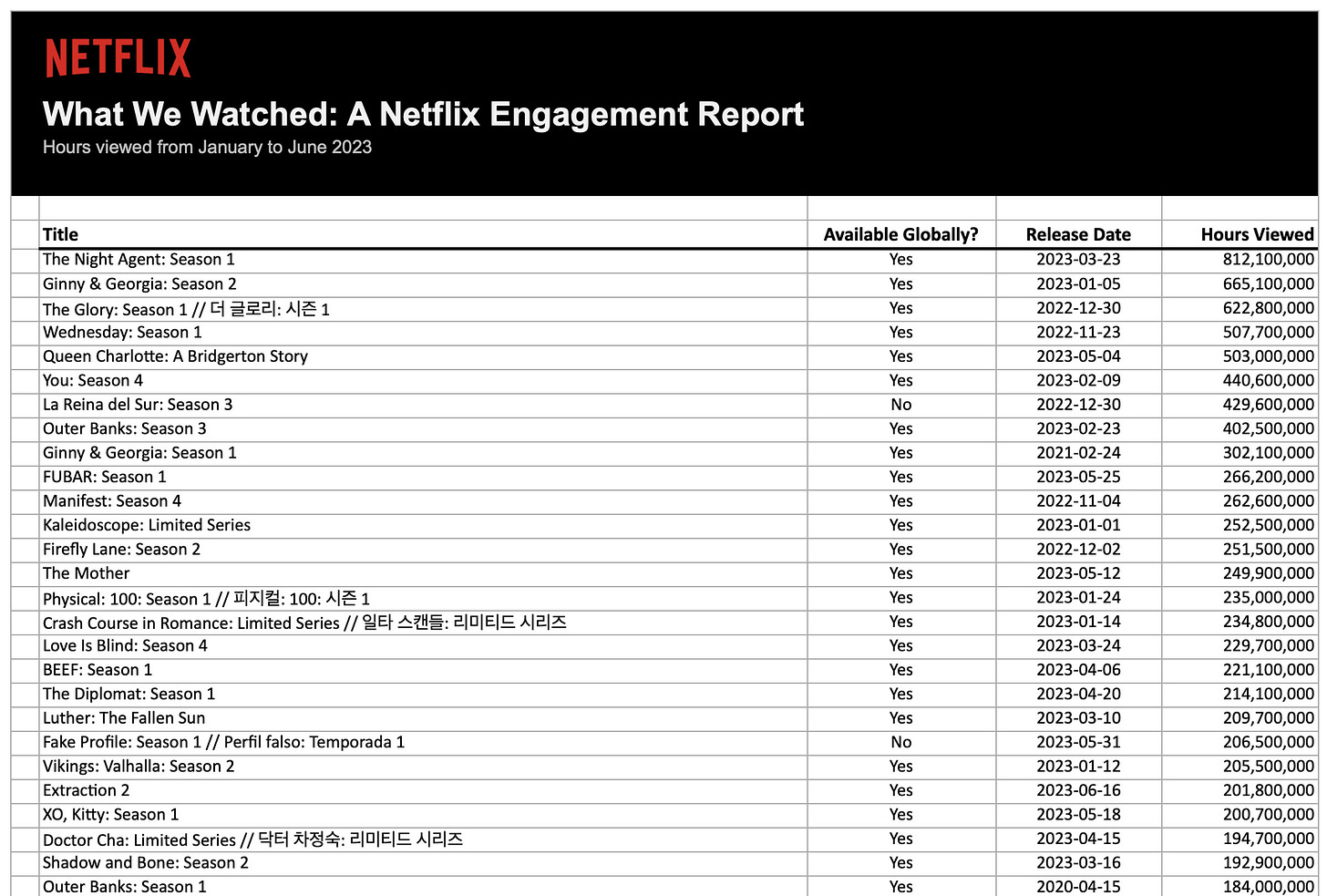Good afternoon, friends! We are closing in on Christmas and the New Year.
This is also going to be the final Fix of 2023 - I’ll pick it back up in the New Year. Thanks for tagging along this year and supporting my little endeavor. This newsletter has been a fun little side project that’s probably made me more productive on Sundays than I would have been otherwise. I don’t think we’ve got the next Morning Brew here, but I’m still having fun writing it - so, I’m going to keep it rolling in 2024. See you people on the other side.
Lastly, if you’ve enjoyed the Fix, feel free to forward this along to a friend. It’s always appreciated.
The Sunday Six
Getting you well-read headed into the week
1) Israel Update
Only days after the news broke that three Israeli hostages were accidentally killed by Israeli forces, US Defense Secretary Lloyd Austin is set to visit Israel and two Persian Gulf nations. His visit comes amid efforts by the Biden administration to encourage Israel to transition from its large-scale ground and air campaign in Gaza to a more targeted approach against Hamas.
This trip comes after US National Security Advisor, Jake Sullivan, traveled to Israel this past week. His comments that Washington was expecting to see a “major rollback” of the IDF’s ground operation “within weeks” were quickly contradicted by NSC spokesman John Kirby who said “I don’t want to put a time stamp on the end of [high-intensity operations]. … The last thing we want to do is telegraph to Hamas what they’re likely to face in the coming months.” I imagine that Secretary Austin will aim to bring a clearer message in his meetings with Prime Minister Netanyahu next week.
The discussions will focus on the implementation of a new strategy, which American officials suggest will involve smaller groups of elite forces. These units are expected to conduct precise, intelligence-driven operations in Gaza, aimed at targeting Hamas leaders, rescuing hostages, and avoiding civilian casualties.
In other related news, seven suspects were arrested across Europe for their involvement in an alleged Hamas plot to attack Jewish individuals in Europe. The individuals were “stockpiling weapons” in preparation for a future terror attack.
Lastly, the firestorm that came over Harvard President Claudine Gay seems to be slowly fading. It appears she is going to keep her job as faculty came out in support of her. Linking two interesting podcasts below - both are related to this topic and dive into what is protected speech, whether or not these presidents should be fired, and how this whole situation mirrors the “cancel culture” of a couple of years back.
2) Federal Reserve
Good week for your 401(k) and for your future mortgage rate prospects. The Dow surged this week after Fed Chairman Jerome Powell said that further rate hikes were “not likely” and that three rate cuts could be likely next year. Powell said that the fight against inflation was not over, but policymakers would begin discussing “policy easing” as inflation and the labor market cool.
Many believe that the Fed’s move will likely benefit Biden in 2024 ahead of the election. As rates are cut, the stock market will likely continue to climb, borrowing will become cheaper and inflation should continue to settle. With more dollars in our wallet, Biden may be able to tout the economy headed into November. As Sarah Binder, a senior fellow at the Brookings Institution said: “The upcoming election exposes [the Fed] to heightened criticism. It makes it harder for them to maintain their credibility and to make good monetary policy.”
Now it will just come down to timing of the rate cuts. J Powell has his work cut out for him in 2024, but cheers to positive growth of our retirement accounts.
3) Mifepristone
The Supreme Court will hear a pivotal case regarding Mifepristone, a key drug used in medication (or medical) abortions, marking its first major abortion case since overturning Roe v. Wade. The dispute centers around an appellate court's decision that seeks to impose significant restrictions on mifepristone, including limiting its availability through mail and reducing the permissible usage period from 10 weeks to 7 weeks of pregnancy.
Mifepristone is integral to medication abortions, which constitute over half of all abortions in the US. Since its approval in 2000, more than 5 million people have used mifepristone.
This case takes on added significance in the wake of the Supreme Court's June 2022 decision, which revoked the constitutional right to an abortion. This landmark ruling has led to total abortion bans in 14 states. Additionally, given that the Court is set to hear this case in the Spring of 2024, it will certainly be discussed in the lead up to the election and leveraged by both parties.
4) Terrorist Watchlist
The US terrorist watchlist has nearly doubled in size over the past six years, reaching approximately 2 million individuals, according to a CBS Reports investigation. This significant increase in the Terrorist Screening Dataset, initially launched in 2003 with around 120,000 names, reflects a broadening scope of surveillance and tracking by US intelligence.
The watchlist, designed to monitor known or suspected terrorists, includes thousands of Americans, though a majority are non-US citizens or legal permanent residents. Government officials stress that being on the list doesn't necessarily equate to being a terrorist but indicates a need for closer scrutiny. However, the criteria for inclusion remain undisclosed, and the government neither confirms nor denies an individual's presence on the list.
Concerns have been raised about the accuracy of the list. A large number of people have faced significant consequences in their daily lives due to being on the watchlist, ranging from travel disruptions to intense law enforcement encounters. The Department of Homeland Security reports that 98% of complaints filed were due to "false positives," often caused by name similarities.
The FBI has recently revised its criteria for adding individuals to the watchlist, requiring more identifying information to reduce errors. This move, along with a focus on biometric data like facial recognition and fingerprints, aims to minimize cases of mistaken identity.
5) Netflix Engagement Report
Netflix introduced the first biannual report, titled "What We Watched: A Netflix Engagement Report," which offers detailed insights into the most popular shows and movies on the platform. The inaugural report, covering January to June 2023, reveals the top titles based on hours viewed. Leading the pack is "The Night Agent" with over 812 million hours, followed by the second season of "Ginny & Georgia," "The Glory," "Wednesday," and "Queen Charlotte: A Bridgerton Story."
This report goes beyond Netflix's existing weekly top 10 lists, providing a broader perspective on the streaming giant's vast library. It includes any content that has surpassed 50,000 hours of viewership, covering more than 18,000 titles in the first half of 2023 alone.
Netflix's co-CEO Ted Sarandos acknowledged that the company's approach to data sharing has evolved. Initially, Netflix kept viewership data private to allow for business growth and learning. However, this lack of transparency led to mistrust among producers and creators. More from The Verge
6) MDMA for PTSD
MAPS Public Benefit Corporation, seen as a leader in mental health treatment innovation, submitted a new drug application to the FDA for MDMA-assisted therapy, designed to treat individuals with PTSD. This is an important step in getting the first FDA-approved psychedelic-assisted therapy for PTSD approved.
For decades, MAPS has been at the forefront of researching and advocating for the therapeutic use of psychedelics, often facing challenges like stigma, regulatory hurdles, and skepticism from traditional medical sectors. Their latest application combines MDMA, commonly known as Molly, with psychological interventions, including psychotherapy, by qualified healthcare providers.
Clinical trial results have been notably promising. Published in Nature, a Phase 3 clinical trial revealed that 71.2% of participants in the MDMA-assisted therapy group no longer met PTSD criteria after 18 weeks, compared to 47.6% in the placebo group. Furthermore, 67% of those receiving three MDMA-assisted therapy sessions were no longer diagnosed with PTSD, with 88% showing a clinically meaningful reduction in symptoms. Pretty freaking awesome.
This approval would have big time implications for those suffering from PTSD, but it may also open up the conversation around psychedilics and their potential use to treat mental health. I think that could be a big win.
The Fix’s Picks
Summarizing and linking to some of my favorite reads, podcasts, photos, and clips from the weekend.
2023 Favorite Reads
Adding in my favorite books from the year
I had a couple favorite books from 2023. A bit of diversity in these books, so maybe there is one in here that calls out to you for 2024.
How to Castrate a Bull by Dave Hitz
My favorite business-related book of the year. Dave Hitz started NetApp, a data storage company, in 1992. Hitz talks about the many lessons he learned in building a successful company - unlike most business books, though, I found this one to be funny and engaging (rather than repeating the same message 10 times.)
As for the name, Hitz claims that castrating bulls is where he learned how to manage that risk: "Dropping out of high school, moving to San Francisco, switching majors, leaving MIPS -all were early experiments in risk taking. Each taught me something valuable about what I wanted (for example, a career in computer science) or what I didn't (a career typing "osteoporosis" and "chlamydia" on index cards). You shouldn't take risks so dangerous that they might kill you. or if you must, get lessons first. But even when not deadly, risk should feel uncomfortable”
Project Hail Mary by Andy Weir
My only fiction read for the year, but a page-turner. Maybe I should read more fiction. Project Hail Mary is the story of a high school science teacher who finds himself in a different solar system with no recollection of how he got there. It sounds hokey, but it’s a fun read that is a great mix of science, the story of friendship, and sci-fi thinking.
Living Life Backwards by David Gibson
Potentially my favorite book of the year. Living Life Backwards dives into the idea that death is the one ultimate certainty in life, yet we live our lives to erase it from our minds and busy ourselves to avoid facing it. Gibson uses Ecclesiastes to guide how living in light of death allows us to reorder our priorities, not hold so tightly to control, and receive the fullness of life as a gift. Although a faith-based book, I would recommend it to anyone who is going to die.
I am convinced that only a proper perspective on death provides the true perspective on life.
Lastly, I would be remiss if I didn’t give my lovely wife a shoutout. The biggest reader I know and full of good recommendations. Check out her book instagram, @rineyreads
US Military’s Slot Machine Business
Did you know that the US military runs more than 3K slot machines on American military bases overseas? The slot machines earn the DOD more than $100M each year, according to NPR. Critics claim that these machines are likely fueling gambling addiction amongst servicemen and women (the rate of gambling issues in the military is 2x that of the general population). Although there have been attempts by lawmakers to remove these machines, they’ve all proven unsuccessful.
I learned this in Tom Whitwell’s “52 things I learned in 2023”. There is some crazy stuff on that list. Couple of others I found most interesting:
31% of all children attending University of Chicago Burn Center for scalding injuries were hurt by instant noodles. [Timothy J. Shen & co]
The average US fridge uses 3–5 times more electricity than an entire human being consumes in Nigeria. [Daisy Dunne & Simon Evans]
Only 28 books sold more than 500,000 copies in the US in 2022. Eight of them were by romance novelist Colleen Hoover. [Jason Colvato]
Cozy Christmas Jazz
Do yourself a favor and cue this playlist up this week
Longevity
I just started Outlive by Dr. Peter Attia. He has become popular in the world of longevity and influential in the lives of some people I know. Although he is rooted in science (and it shows when he talks), he does a good job of simplifying how you should be approaching health now so that you can live the longest and happiest as possible.
He was recently on Scott Galloway’s podcast. If you don’t want to slog through the book, this is a solid listen.
The Best of the Rest
All the funny or wise content I came across to kick your week off right
Beets by Dre
Duolingo
Dalai Lama
Moms on Christmas
Merry Christmas, Happy New Year, see you in 2024.










